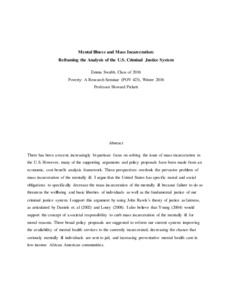Mental Illness and Mass Incarceration: Reframing the Analysis of the U.S. Criminal Justice System

View/
Author
Swabb, Emma M.
Subject
Washington and Lee University -- Capstone in Shepherd Program for the Interdisciplinary Study of Poverty and Human Capability
Mentally ill offenders -- Mental health services
Mentally ill offenders -- Legal status, laws, etc.
Theory of justice (Rawls, John)
Alternatives to imprisonment
Metadata
Show full item recordDescription
Emma Swabb is a member of the Class of 2016 of Washington and Lee University. Capstone; [FULL-TEXT FREELY AVAILABLE ONLINE] There has been a recent, increasingly bi-partisan focus on solving the issue of mass incarceration in the U.S. However, many of the supporting arguments and policy proposals have been made from an economic, cost-benefit analysis framework. These perspectives overlook the pervasive problem of mass incarceration of the mentally ill. I argue that the United States has specific moral and social obligations to specifically decrease the mass incarceration of the mentally ill because failure to do so threatens the wellbeing and basic liberties of individuals as well as the fundamental justice of our criminal justice system. I support this argument by using John Rawls's theory of justice as fairness, as articulated by Daniels et. al (2002) and Loury (2008). I also believe that Young (2004) would support the concept of a societal responsibility to curb mass incarceration of the mentally ill for moral reasons. Three broad policy proposals are suggested to reform our current system: improving the availability of mental health services to the currently incarcerated, decreasing the chance that seriously mentally ill individuals are sent to jail, and increasing preventative mental health care in low-income African American communities.